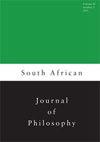回顾非洲认识论中的见证
IF 0.2
3区 哲学
0 PHILOSOPHY
引用次数: 2
摘要
本文讨论了Barry Hallen和J. Olubi Sodipo在约鲁巴草药学家或医学硕士(onisegun)中开创性的哲学田野调查中提出的重要认识论问题。更确切地说,我将主要调查并反对他们在约鲁巴认识论实践中对证词所持的过度限制性观点。以这种批评为出发点,但仍然以海伦和索迪波提供的案例为基础,我探索了像约鲁巴这样的“口头文化”(传统上描述的)可以依靠证词作为辩护来源的不同方式,而不会屈服于这种社会对传统的轻信和不批判的态度。为此,我引用了在Hallen和Sodipo发表他们的著作后分析认识论的相关发展。本文章由计算机程序翻译,如有差异,请以英文原文为准。
Testimony in African epistemology revisited
This article addresses important epistemological issues raised by Barry Hallen and J. Olubi Sodipo’s pioneering philosophical fieldwork among Yoruba herbalists or masters of medicine (onisegun). More precisely, I shall primarily investigate, as well as object to, the unduly restrictive view they take on testimony in Yoruba epistemic practice. With this criticism as the starting point, but still based on the cases Hallen and Sodipo provide, I explore different ways in which an “oral culture” like Yoruba (as traditionally depicted) can rely on testimony as a source of justification without succumbing to the gullible and uncritical attitude towards tradition such societies have been charged with. To this purpose, I put to use relevant developments in analytic epistemology taking place after Hallen and Sodipo published their work.
求助全文
通过发布文献求助,成功后即可免费获取论文全文。
去求助
来源期刊

SOUTH AFRICAN JOURNAL OF PHILOSOPHY
PHILOSOPHY-
CiteScore
1.00
自引率
0.00%
发文量
19
期刊介绍:
The South African Journal of Philosophy (SAJP) is the official publication of the Philosophical Society of South Africa. The aim of the journal is to publish original scholarly contributions in all areas of philosophy at an international standard. Contributions are double-blind peer-reviewed and include articles, discussions of articles previously published, review articles and book reviews. The wide scope of the South African Journal of Philosophy makes it the continent''s central vehicle for the publication of general philosophical work. The journal is accredited with the South African Department of Higher Education and Training.
 求助内容:
求助内容: 应助结果提醒方式:
应助结果提醒方式:


